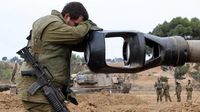On September 2, 2025, the Israel Defense Forces (IDF) Chief of Staff, Lt. Gen. Eyal Zamir, officially declared the beginning of a ground operation in Gaza City, signaling a new and decisive phase in the long-running conflict between Israel and Hamas. The announcement came after weeks of mounting preparations and a contentious debate within Israel’s political and military leadership about the timing, scope, and objectives of the offensive.
Prime Minister Benjamin Netanyahu, who had approved the military’s plans to seize Gaza City in August, delivered a message of solidarity and encouragement to IDF reservists and their families. “Now we are facing the decisive stage. I believe in you, I trust you and the entire nation embraces you,” Netanyahu said, underscoring the gravity of the moment and the expectations placed on the military. The government’s stated goals remain unchanged: the release of all hostages held by Hamas, the dismantling of Hamas’ military and political infrastructure, the demilitarization of Gaza, and the imposition of a civil authority in the territory that excludes both Hamas and the Palestinian Authority.
Yet, as tens of thousands of Israeli reservists began reporting for duty, the unity and resolve that typically characterize such mobilizations appeared to be fraying. According to The Jerusalem Post, about 40,000 reservists were expected to be called up for the operation, with the IDF sending out approximately 60,000 call-up papers in August. However, reports from Haaretz and The Wall Street Journal revealed a growing “crisis of trust” between the government and the military, as hundreds of reservists openly questioned the wisdom of the invasion and threatened not to report for duty.
“This rotation is the toughest yet. Many feel conflicted over concerns for the hostages held by Hamas,” one reservist told Haaretz. “No one can tell me any fairy tales after 280 days of fighting in Gaza. I know Gaza, unfortunately. The conquest of Gaza has nothing to do with bringing back the hostages. Every one of us understands that.” Another reservist, Ron Feiner, was even more explicit in a joint statement signed by around 350 reservists: “The decision to embark on an operation to finally occupy Gaza is clearly illegal and will put the hostages, soldiers, and civilians at risk. If we are called to reserve duty – we will not report. We will not obey any orders that are sent.”
These sentiments reflect a wider exhaustion within the ranks. Most reservists have already served hundreds of days since the war began on October 7, 2023, and are now being asked to commit to another three months, with a possible one-month extension depending on how the fighting unfolds. The IDF has even resorted to using WhatsApp groups to recruit university students for specialized roles in the upcoming 70-day operation, as reported by the Wall Street Journal. “It’s not clear how many of them will return to the fight,” The New York Times noted, with some units reportedly seeing only 40 to 50 percent of soldiers showing up for duty.
The internal discord is mirrored by sharp debates at the highest levels of Israel’s leadership. During a heated cabinet meeting on September 1, Zamir called for a ceasefire deal, warning that the campaign could endanger the hostages still held in Gaza and overextend the army, according to The Jerusalem Post. IDF officials stated that the operation could not begin for at least two months due to logistical and humanitarian concerns, arguing that more time was needed to deliver aid to civilians in Gaza, where starvation has become rampant. Nonetheless, Netanyahu and his security cabinet have pressed for a faster timetable, determined to eliminate what they describe as Hamas’ last bastion.
The humanitarian situation in Gaza has indeed reached catastrophic levels. The Hamas-run Ministry of Health reported that, in the 24 hours before September 2, at least 76 people were killed and 281 injured, including 12 killed while trying to obtain humanitarian aid. Thirteen people, among them three children, starved to death in the same period. Since October 7, 2023, at least 361 people—including 130 children—have died of malnutrition, with August 2025 alone accounting for 185 such deaths, the highest monthly toll since the war began. Less than two weeks before the current operation, the world’s leading food crisis authority, the IPC, determined that famine conditions exist in Gaza.
Repeated deadly shootings around aid distribution centers have killed hundreds, according to the United Nations. More than 100 aid organizations have described the food shortage as “mass starvation,” warning that some aid workers are now joining food lines themselves, risking their lives just to feed their families. The blockade and ongoing violence have forced thousands of displaced Palestinians into overcrowded camps in southern Gaza, where they face poverty, hunger, skin diseases, and a severe lack of drinking water. “My daughter, my wife, and I are old and sick. We only have a two-meter tent. There is no place to live. Inside the tent we eat, drink water, cook, and light a fire. Everything is inside the same tent,” Eman al-Naqaa, a displaced Palestinian, told local reporters.
International organizations have warned that the violence could permanently endanger Palestinian collective life in Gaza. The International Crisis Group has described the military campaign as having entered a “nightmarish” stage, emphasizing that only firm pressure from the United States, Europe, and Arab countries could push the warring parties toward a political agreement.
Meanwhile, the toll of Israel’s offensive continues to mount. Since October 7, 2023, at least 63,633 Palestinians have been killed—mostly women and children—and 160,914 have been injured, according to Gaza’s Health Ministry. At least 10,000 people are unaccounted for and presumed dead under the rubble of their homes. Over 1,000 buildings have been demolished in Gaza City since last month, targeting Hamas command centers, weapons caches, and tunnel networks embedded in civilian areas. The destruction has left thousands without homes, and hundreds trapped under debris.
Israel’s actions have also drawn international legal scrutiny. In November 2024, the International Criminal Court issued arrest warrants for Netanyahu and former defense minister Yoav Gallant for alleged war crimes and crimes against humanity in Gaza. The country also faces a genocide case at the International Court of Justice, further complicating its international standing and fueling debate within Israeli society.
Back home, opposition to the war is growing. A significant number of Israeli citizens have staged street protests demanding an end to the fighting, while some senior military commanders warn that continued attacks could cause mass civilian casualties and escalate tensions further. Surveys cited by Reuters suggest notable dissatisfaction within the ranks, with some reservists doubting the efficacy of the campaign and the government’s strategy for victory. “I don’t feel like I’m doing anything that really applies significant pressure to have Hamas release the hostages,” one combat reservist told Reuters, expressing a sentiment that seems to be spreading among the troops.
As the ground operation in Gaza City unfolds, the stakes for all sides could hardly be higher. With Israeli forces expanding their aggression on the city’s outskirts and displaced Palestinians enduring dire conditions in the south, the prospect of a swift or peaceful resolution appears remote. For now, the war grinds on—its human cost rising by the day, and its political and moral questions growing ever more urgent.





